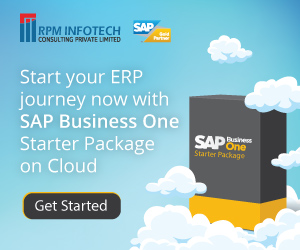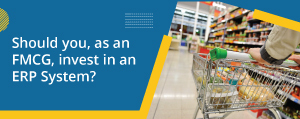Should you, as an FMCG, invest in an ERP System?

As an FMCG business, you see it all, exciting times as well as challenging. Owning your own small or medium-scale FMCG business usually means working to overcome challenges every day and holding ground in a competitive market. Turnaround time is critical in this industry as many processes work in a sequence, and ensuring a smooth flow is essential to ensure timely delivery of your product.
An ERP system is an integrated set of subsystems that consolidates and automates all your business processes such as planning, manufacturing, logistics, sales, and marketing. It accumulates data from various sources and integrates it to give you better visibility of sales, inventory, and production in progress data.
This is an invaluable tool to reduce cost, increase sales, and most importantly, help organizations make the correct planning and strategic decisions that can directly impact the actual bottom line of any consumer goods business, product positioning, and pricing.
An ERP system like SAP Business One, specifically designed keeping in mind the needs of SMEs in this industry, can act as that single business management system that also supports the budgetary requirements of small and medium-sized businesses in mind.
What Can SAP Business One do for your FMCG business?
1. Automate your business processes
SAP Business One (SAP B1) keeps all your data in one central location, accessible to all functional departments like development, plant, procurement, finance, sales, delivery, etc. Whether on-site and off-site, each team can keep track of the progress in real-time without relying on manual intervention by other teams, which can give rise to errors. Complete end-to-end transparent process integration helps with a collaborative effort between departments towards efficiency and higher productivity. Artificial Intelligence (AI) integration can also help you understand and predict consumer buying patterns.
2. Complete material tracking and traceability
Tracking of stock, batches, orders, and batch expiry dates is possible, along with unit-wise and product-wise tracking of WIP in real-time gives you clear visibility into the status of planned targets versus actual progress.
3. Tracking of expiry, rework, rejections and wastages
Ensuring that raw material usage is optimized by keeping a system check so that material nearing its expiry date is assigned to be used in the production process in time to reduce wastage and rework. Rejections are taken into account such that profitability is ensured.
4. Customization
Our auto batch pick add-on can assign batches based on first expiry first out (FEFO), units of measure, strength, license, serial number, shelf life, and location to ensure the proper inventory for manufacturing and distribution activities.
Similarly, promotions are a big part of the retail sales and distribution of the consumer goods industry. Sale orders automatically redeem schemes, promotions, and coupons during the order processing, and sales orders can be consolidated from different portals, locations, verticals, and cost centers.
5. Compliance and Quality Control
From vendor inspection projects to formula and finished good QC testing, SAP B1 establishes a comprehensive QA program that ensures the delivery of quality products to your customers. Where compliance is required with industry-specific guidelines in terms of labeling, lot traceability reports, transactional audit reports, and shipping documentation, SAP B1 can quickly achieve that with some customization through Add-Ons.
6. Maintenance
Establishes a preventive maintenance program to avoid unnecessary equipment failures and keep your plant running smoothly.
7. Website Portal and E-Commerce Integration
Website portal and e-commerce integration offered by SAP Business One wherein online portal purchases in customer carts will be integrated with internal organizational SAP ERP. Multiple marketplace integrations are also possible with the help of Unicommerce integration.
8. 3PL and E-Commerce Integration
3rd party partner delivery systems are integrated into SAP B1 to track serviceable shipping codes for online orders, and various payment methods, including COD, are updated with payment transactions. Sales orders are consolidated from different portals, locations, verticals, and cost centers.
9. Warehouse Management System
Multiple warehouse management along with barcode management, pick-and-pack manager to facilitate free and smooth goods movement.
Customer satisfaction is the ultimate goal of companies in the consumer goods industry. SAP Business One ERP can help you remove your business hurdles and improve your customers’ purchase and delivery experience of your product.The real-time data and analytics helps you organize your critical business processes and eliminate the gaps to ensure company profitability as a business owner or stakeholder.
SUGGESTED BLOGS
8 reasons why your manufacturing business should adopt SAP Business One ERP today!
RPM Team2024-07-25T15:50:08+05:308 Compelling Reasons Why Your Manufacturing Business Should Adopt SAP Business One ERP Today [...]
How ERP systems can drive sustainability in your business
RPM Team2023-05-22T12:23:43+05:30How ERP systems can drive sustainability in your business Sustainability is critical to companies in [...]
How can you as the CEO of an SME benefit with the right ERP system
RPM Team2023-05-22T12:22:42+05:30How can you as the CEO of an SME benefit with the right ERP system? [...]
Should you, as an FMCG, invest in an ERP System?
RPM Team2023-05-30T20:26:31+05:30Should you, as an FMCG, invest in an ERP System? As an FMCG business, [...]
Here are a few things you probably did not know about SAP Business One
RPM Team2023-05-30T20:23:54+05:30Here are a few things you probably did not know about SAP Business One [...]
Digital Transformation
RPM Team2023-05-30T20:23:09+05:30Unveil the potential of your digital initiatives with Intelligent ERP – SAP Business One [...]








